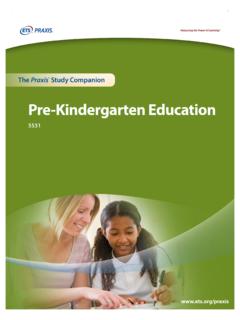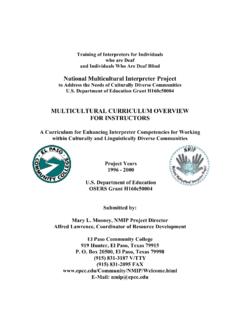Transcription of The Trivium of Classical Education
1 The Trivium of Classical Education Lifelong-Learner Grammar Dialectic Rhetoric Historical Development Decline in the 20th Century and Resurgence in Recent Decades A Dissertation Presented to The Graduate Faculty of Greenleaf University In Partial Fulfillment of the Requirements for the Degree of Doctor of Philosophy Randall D. Hart July 2004. THE Trivium OF Classical Education : HISTORICAL DEVELOPMENT. DECLINE IN THE 20TH CENTURY. AND. RESURGGENCE IN RECENT DECADES. A Dissertation Presented to The Graduate Faculty of Greenleaf University In Partial Fulfillment of the Requirements for the Degree of Doctor of Philosophy Randall D. Hart July 2004. i THE Trivium OF Classical Education : HISTORICAL DEVELOPMENT.
2 DECLINE IN THE 20TH CENTURY. AND. RESURGGENCE IN RECENT DECADES. DISSERATION. By Randall D. Hart APPROVED BY: _____. Shamir Andrew Ally, , Advisor Chairman and Senior Faculty Member _____. Norman Pearson, , DBA, (Mgmt.). President and Chief Academic Officer _____. Dorothy Lupascu, Committee Member ii Copyright by Randall D. Hart, 2004. All Rights Reserved iii Abstract In 1983, the National Commission on Excellence published a document entitled A. Nation at Risk, which called for drastic reforms in our nation's schools. If an unfriendly foreign power had attempted to impose on America the mediocre educational performance that exists today, we might well have viewed it as an act of war.
3 (p. 5). In the two decades since this report, hundreds of national, state, and local-level commissions, task forces and study groups were formed. The initial answers seemed to be found in the centralization of power. The first wave reform concentrated on raising academic standards through new academic requirements for students and increased regulations for teachers. Along with the additional requirements, taxes rose, school spending soared and a great deal of academic related legislation was passed. The reform movements of the last decade are sometimes referred to as second wave . reforms. States continue to exert more control over the Education system, with accountability, as measured by achievement testing, remaining a major component.
4 School choice, including voucher systems and charter schools, remains a hotbed for political debate. Today's third wave reforms contain a workable amalgamation of aspects of both previous reform movements. However, today there is an emphasis on whole-school . reform models as advocated by the federal government in the No Child Left Behind (NCLB) legislation. This study provides an overview of a whole-school reform model known as the Trivium of Classical Education . The Trivium consisting of the educational skills of grammar, dialectic, and rhetoric was developed by the ancient iv Greek philosophers. The content and the methodology of the Trivium was the prerequisite requirement for acceptance into a European medieval university.
5 The purpose of this research was to seek answers to the following questions regarding Classical Education : 1. What is a Classical or liberal arts Education ? 2. What are the tools of the Trivium and how, when, and where did they originate? 3. What is the purpose of Classical Education ? 4. What type of curricula should be used in Classical schools? 5. What type of instruction should be provided by teachers in Classical schools? 6. What is the role of the teacher in a Classical school? 7. What is the role of the student in Classical Education ? 8. What are the educational philosophies under girding a Classical Education ? 9. What role did Classical Education play in the development of the medieval university system?
6 10. What factors were responsible for the decline of Classical Education in America during the late 19th and 20th centuries? 11. Historically, how did the Paideia Group and the Association of Classical and Schools develop? The initial section of this dissertation seeks to share with teachers and laypersons the importance of seeking an understanding of basic philosophies that impact Education . Without this background and knowledge, one is ill-equipped to make important educational decisions. An analysis of idealism and realism, which spawned Classical v Education , will be juxtaposed with pragmatism, the catalyst behind Dewey's progressive Education that has so profoundly affected our American educational system.
7 Beginning with prominent Greek philosophers, the development of the tools of the Trivium will be analyzed. In addition, a brief history of the advent and development of medieval universities is explored, followed by an analysis of why Classical Education so seriously declined during the second half of the 19th and the 20th centuries. This dissertation also presents an analysis of two models of Classical Education that have had a significant effect on the reemergence of Classical schools across this country. Classical Education as advocated by Mortimer Adler (1982) in his book The Paideia Proposal is reviewed. Adler was a prolific writer, philosopher, and advocate of the Great Book approach.
8 In addition, the Classical Christian approach to Education based on the essay written by Dorothy L. Sayers entitled The Lost Tools of Learning is examined. Sayers, who is well known as a mystery writer and a translator of Dante's Divine Comedy, presented this essay as a speech at Oxford University in 1947. Her essay is indirectly responsible for the development of approximately 200 schools and the formation of the Association of Classical and Christian Schools (ACCS). In her essay, Sayers implored the educational community to return to a Classical pedagogy that she claimed was effectively used in schools during the middle ages. What she called for is a return to using the Trivium the tools of grammar, dialectic, and rhetoric that effectively equipped students to attend university for the past several hundreds of years.
9 Vi Acknowledgements First, I would like to express my thanks to The Foundation for Reformation and specifically to Mr. and Mrs. James Seneff for their gracious generosity in providing the financial means necessary for allowing me to finish this dissertation. I also would like to express my appreciation to Dr. Luder Whitlock for serving as my mentor and friend. His erudition and godly wisdom was invaluable. Secondly, appreciation is gratefully extended Orangewood Presbyterian Church in Maitland, Florida, along with Rev. Jeff Jakes and Youth Director Jamie Hart, for their graciousness in providing free office space during this lengthy process. Thirdly, I thank my faithful Savior for allowing me the privilege of working as an educator with his children for these past 27 years.
10 Vii Dedication This dissertation is dedicated to my faithful and loving wife, Jan, who has been by my side supporting me for over 30 years. Her encouragement for me as a teacher and principal is what has enabled me the great privilege of serving at various schools in Michigan, Illinois, and Florida. Because of her, our life together has been quite an adventure. viii Table of Contents Title Page . i Approval Page .. ii Copyright .. iii Abstract iv Acknowledgements .. vii Dedication viii Table of Contents . ix List of Tables xiii Chapter 1 INTRODUCTION TO THE STUDY 1. Purpose of the Study 3. Research Questions 4. Definitions of Terms 6. Limitations 9. Organization of the Study 9.





